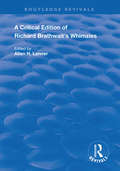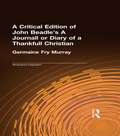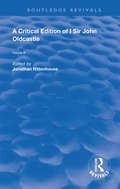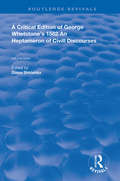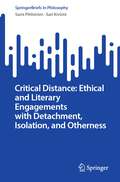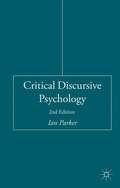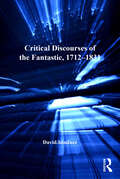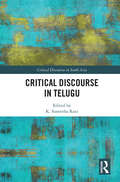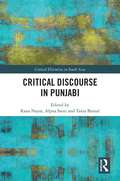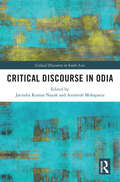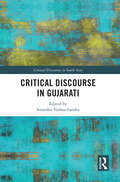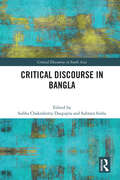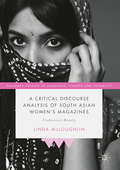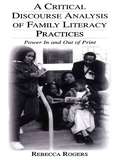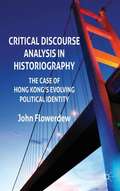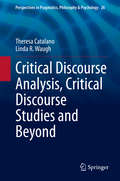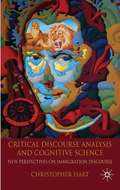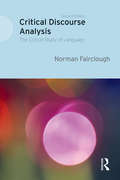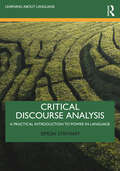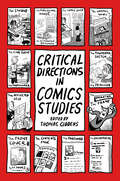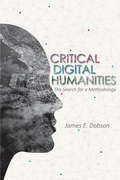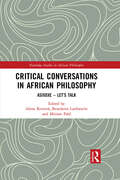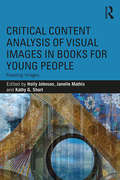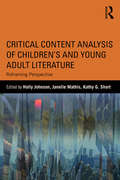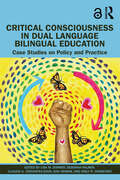- Table View
- List View
A Critical Edition of Richard Brathwait's Whimzies (Routledge Revivals)
by Allen H. LannerOriginaly published in 1991, this volume contains the full text of Richard Brathwait's 'Whimzies,' alongside textual notes including chapters on the character as a literary genre, the overburian characters and an annotation of the text.
A Critical Edition of John Beadle's A Journall or Diary of a Thankfull Christian (Renaissance Imagination)
by Germaine Fry MurrayFirst Published in 1996. Routledge is an imprint of Taylor & Francis, an informa company.
A Critical Edition of I SIr John Oldcastle (Routledge Revivals)
by Jonathan RittenhouseOriginally published in 1984, this book contains the full text of I, Sir John Oldcastle, alongside critical and textual notes, including an examination of the authors and the theatrical background and assessment. For such an obscure play, I Sir John Oldcastle has had a varied printing history and has been printed eighteen times since its original 1600 publication date. The text here is a modern-spelling version and archaic forms are only presered where rhyme or metre requires them, or when modernization obscres rather than clarifies the required sense of the word.
A Critical Edition of George Whetstone’s 1582 An Heptameron of Civil Discourses (Routledge Revivals)
by George WhetstonePublished in 1987: This edition seeks to make available, for the scholar and the student of Elizabethan literature, an accurate text of an Heptameron of Civill Discourses.
Critical Distance: Ethical and Literary Engagements with Detachment, Isolation, and Otherness (SpringerBriefs in Philosophy)
by Sami Pihlström Sari KivistöThis book argues that no ethically appropriate relation to other human beings is possible unless we treat them as genuinely other. The authors provide reasons to be critical of various attempts, many of them popular in our contemporary (Western) culture, to encourage deeper attachment to and immersion into others’ lives and experiences. They defend the significance of the distance between human beings, criticizing exaggerated uses of, e.g., the concept of empathy and related concepts in academic as well as more popular ethical contexts, across a range of issues from the nature of ethical duty to the philosophy of love. The chapters offer non-technical philosophical and cultural criticism through selected perspectives on the continuum between closeness and distance, exploring various aspects of ethically significant relations between human beings. This book thus appeals to a wide audience, especially researchers and students in different fields of the humanities, including philosophy, literary studies, and cultural studies, by combining philosophical and literary methodologies in a humanistic examination of the value of distance. The book also argues that we have to be able to abstract from the concrete other in ethical relations, living in the normative and rational sphere of duty instead of emotional immersion.
Critical Discursive Psychology
by Ian ParkerCritical Discursive Psychology addresses issues in critical discursive research in psychology, and outlines the historical context in the discipline for the emergence of qualitative debates. Key critical theoretical resources are described and assessed and a series of polemics is staged that brings together writers who have helped shape critical work in psychology. It also sets out methodological steps for critical readings of texts and arguments for the role of psychoanalytic theory in qualitative research.
Critical Discourses of the Fantastic, 1712-1831
by David SandnerChallenging literary histories that locate the emergence of fantastic literature in the Romantic period, David Sandner shows that tales of wonder and imagination were extremely popular throughout the eighteenth century. Sandner engages contemporary critical definitions and defenses of eighteenth- and early nineteenth-century fantastic literature, demonstrating that a century of debate and experimentation preceded the Romantic's interest in the creative imagination. In 'The Fairy Way of Writing,' Joseph Addison first defines the literary use of the supernatural in a 'modern' and 'rational' age. Other writers like Richard Hurd, James Beattie, Samuel Johnson, James Percy, and Walter Scott influence the shape of the fantastic by defining and describing the modern fantastic in relation to a fabulous and primitive past. As the genre of the 'purely imaginary,' Sandner argues, the fantastic functions as a discourse of the sublime imagination, albeit a contested discourse that threatens to disrupt any attempt to ground the sublime in the realistic or sympathetic imagination. His readings of works by authors such as Ann Radcliffe, William Beckford, Horace Walpole, Mary Shelley, Walter Scott, and James Hogg not only redefine the antecedents of the fantastic but also offer a convincing account of how and why the fantastic came to be marginalized in the wake of the Enlightenment.
Critical Discourse in Telugu (Critical Discourses in South Asia)
by K. Suneetha RaniThis volume forms a part of the Critical Discourses in South Asia series which deals with schools, movements and discursive practices in major South Asian languages. It offers crucial insights into the making of Telugu literature and its critical tradition across over a century. The book brings together English translation of major writings of influential figures dealing with literary criticism and theory, aesthetic and performative traditions, re-interpretations of primary concepts, categories and interactions in Telugu. It presents 32 key texts in literary and cultural studies representing thoughts, debates, signposts and interfaces on important trends in critical discourse in the Telugu region from the middle of the 19th to the end of the 20th century, with nearly all translated by experts for the first time into English. The volume covers a wide array of themes, ranging from a text by Kandukuri Veeresalingam on women’s education to Challapalli Swaroopa Rani on new readings of the oral literature of the marginalised communities. These radical essays explore the interconnectedness of the socio-cultural and historical developments in the colonial and post-independence period in the Telugu region. They discuss themes such as integrative aesthetic visions; poetic and literary forms; modernism; imagination; power structures and social struggles; ideological values; cultural renovations; and collaborations and subversions. Comprehensive and authoritative, this volume offers an overview of the history of critical thought in Telugu literature in South Asia. It will be essential for scholars and researchers of Telugu language and literature, literary criticism, literary theory, comparative literature, Indian literature, cultural studies, art and aesthetics, performance studies, history, sociology, regional studies and South Asian studies. It will also interest the Telugu-speaking diaspora and those working on the intellectual history of Telugu and conservation of languages and culture.
Critical Discourse in Punjabi (Critical Discourses in South Asia)
by Rana Nayar Alpna Saini Tania BansalThis volume forms a part of the Critical Discourses in South Asia series which deals with schools, movements and discursive practices in major South Asian languages. It offers crucial insights into the making of the Punjabi language and literature, and its critical tradition across a century. The book brings together English translation of major writings of influential figures dealing with literary criticism and theory, aesthetic and performative traditions and re-interpretations of primary concepts and categories in Punjabi. It presents 30 key texts in literary and cultural studies from Punjab from the beginning of development of Punjabi language to its present form, with most of them translated for the first time into English. These seminal essays cover interconnections with socio-historical events in the medieval, colonial and post-independence period in Punjab. They discuss themes such as spiritual and aesthetic visions, poetic and literary forms, modernism, progressivism, feminism, Dalit literature, power structures and social struggles, ideological values, cultural renovations, and humanism. Comprehensive and authoritative, this volume offers an overview of the history of critical thought in Punjabi literature in South Asia. It will be essential for scholars and researchers of Punjabi language and literature, literary criticism, literary theory, comparative literature, Indian literature, cultural studies, art and aesthetics, performance studies, history, sociology, regional studies and South Asian studies. It will also interest the Punjabi-speaking diaspora and those working on the intellectual history of Punjab and conservation of languages and culture.
Critical Discourse in Odia (Critical Discourses in South Asia)
by Jatindra Kumar Nayak and Animesh MohapatraThis volume forms a part of the Critical Discourses in South Asia series which deals with schools, movements and discursive practices in major South Asian languages. It offers crucial insights into the making of Odia literature and its critical tradition across a century. The book brings together English translation of major writings of influential figures dealing with literary criticism and theory, aesthetic and performative traditions and re-interpretations of primary concepts and categories in Odia. It presents 25 key texts in literary and cultural studies from late 19th century to early 21st century, translated by experts for the first time into English. These seminal essays explore complex interconnections between socio-historical events in the colonial and post-Independence period in Odisha and the language movement. They discuss themes such as the evolving idea of literature and criteria of critical evaluation; revision and expansion of the literary canon; the transition from orality to print; emergence of new reading practices resulting in shifts in aesthetic sensibility; dialectics of tradition and modernity; and the formation, consolidation and political consequences of a language-based identity. Comprehensive and authoritative, this volume offers an overview of the history of critical thought in Odia literature in South Asia. It will be essential for scholars and researchers of Odia language and literature, literary criticism, literary theory, comparative literature, Indian literature, cultural studies, art and aesthetics, performance studies, history, sociology, regional studies and South Asian studies. It will also interest the Odia-speaking diaspora and those working on the intellectual history of Odisha and eastern India and conservation of language and culture.
Critical Discourse in Gujarati (Critical Discourses in South Asia)
by Sitanshu YashaschandraThis volume forms part of the Critical Discourses in South Asia series, which deals with schools, movements, and discursive practices in major South Asian languages. It offers crucial insights into the making of Gujarati literature and its critical tradition across a century / several centuries. The book presents one of a kind historiography of Gujarati literature and of its critical discourse. It brings together English translations of major writings of influential figures dealing with literary criticism and theory, aesthetic and performative traditions, and re-interpretations of primary concepts and categories in Gujarati. It initiates an exploration into Gujarati critical discourse from the heather to neglected pre-colonial centuries and presents key texts in literary and cultural studies, some of which are being made available for the first time into English. These seminal essays explore complex interconnections understand the dynamics of critical discursive situations in Gujarati literature and to carefully construct a mobile post of observation that matches those dynamics. They offer a radical departure from the widespread historiographical practice in Indian writings of disregarding pre-colonial literary critical discourse. The book also offers a new and indigenous periodization of Gujarati literature and its critical discourse, derived from a fresh perception of Gujarati and Indian literary culture. Comprehensive and authoritative, this volume offers an overview of the history of critical thought in Gujrati literature in South Asia. It will be essential for scholars and researchers of Gujarati language and literature, literary criticism, literary theory, comparative literature, Indian literature, cultural studies, art and aesthetics, performance studies, history, sociology, regional studies, and South Asian studies. It will also interest the Gujarati-speaking diaspora and those working on the intellectual history of Gujarat and Western India and conservation of the language and their culture.
Critical Discourse in Bangla (Critical Discourses in South Asia)
by Subha Chakraborty Dasgupta Subrata SinhaThis volume forms a part of the Critical Discourses in South Asia series which deals with schools, movements and discursive practices in major South Asian languages. It offers crucial insights into the making of Bengali or Bangla literature and its critical tradition across a century. The book brings together English translation of major writings of influential figures dealing with literary criticism and theory, aesthetic and performative traditions and re-interpretations of primary concepts and categories in Bangla. It presents 32 key texts in literary and cultural studies from Bengal from the middle of the 19th to that of the 20th century, with most of them translated for the first time into English. These seminal essays cover interconnections with socio-historical events in the colonial and post-independence period in Bengal, including the background to the language movement in Bangladesh. They discuss themes such as integrative aesthetic visions; poetic and literary forms; modernism; imagination; power structures and social struggles; ideological values; cultural renovations; and humanism. Comprehensive and authoritative, this volume offers an overview of the history of critical thought in Bangla literature in South Asia. It will be essential for scholars and researchers of Bengali/Bangla language and literature, literary criticism, literary theory, comparative literature, Indian literature, cultural studies, art and aesthetics, performance studies, history, sociology, regional studies and South Asian studies. It will also interest the Bengali-speaking diaspora and those working on the intellectual history of Bengal and conservation of languages and culture
A Critical Discourse Analysis of South Asian Women's Magazines: Undercover Beauty (Palgrave Studies in Language, Gender and Sexuality)
by Linda McloughlinThis intriguing book applies Critical Discourse Analysis to a range of South Asian women’s lifestyle magazines, exposing the disconnection between the magazines’ representations of South Asian women and the lived realities of the target audience. The author challenges the notion that discourses of freedom and choice employed by women’s magazines are emancipatory, demonstrating instead that the version of feminism on offer is a commodified form which accords with the commercial aims of the publications. McLoughlin demonstrates that whilst British magazines present women in the East as the exotic and culturally superior ‘Other’, women in India are encouraged to emulate Western women to signify their engagement with globalization and modernity. She uses data from focus groups carried out in both countries to illustrate the interpretive frameworks and multivocality of participants’ attitudes, experiences and beliefs. This thought-provoking book will appeal to students and researchers of Language and Linguistics, Women’s Studies, Anthropology, Sociology, Media, Communications and Cultural Studies.
A Critical Discourse Analysis of Family Literacy Practices: Power in and Out of Print
by Rebecca RogersIn this groundbreaking, cross-disciplinary book, Rebecca Rogers explores the complexity of family literacy practices through an in-depth case study of one family, the attendant issues of power and identity, and contemporary social debates about the connections between literacy and society. The study focuses on June Treader and her daughter Vicky, urban African Americans labeled as "low income" and "low literate." Using participant-observation, ethnographic interviewing, photography, document collection, and discourse analysis, Rogers describes and explains the complexities of identity, power, and discursive practices that June and Vicky engage with in their daily life as they proficiently, critically, and strategically negotiate language and literacy in their home and community. She explores why, despite their proficiencies, neither June or Vicky sees themselves as literate, and how this and other contradictions prevent them from transforming their literate capital into social profit. This study contributes in multiple ways to extending both theoretically and empirically existing research on literacy, identity, and power: * Critical discourse analysis. The analytic technique of critical discourse analysis is brought into the area of family literacy. The detailed explanation, interpretation, and demonstration of critical discourse analysis will be extremely helpful for novices learning to use this technique. This is a timely book, for there are few ethnographic studies exploring the usefulness and limits of critical discourse analysis. * Combines critical discourse analysis and ethnography. This new synthesis, which is thoroughly illustrated, offers an explanatory framework for the stronghold of institutional discursive power. Using critical discourse analysis as a methodological tool in order to build critical language awareness in classrooms and schools, educators working toward a critical social democracy may be better armed to recognize sources of inequity. * Researcher reflexivity. Unlike most critical discourse analyses, throughout the book the researcher and analyst is clearly visible and complicated into the role of power and language. This practice allows clearer analysis of the ethical, moral, and theoretical implications in conducting ethnographic research concerned with issues of power. * A critical perspective on family literacy. Many discussions of family literacy do not acknowledge the raced, classed, and gendered nature of interacting with texts that constitutes a family's literacy practices. This book makes clear how the power relationships that are acquired as children and adults interact with literacy in the many domains of a family's literacy lives. A Critical Discourse Analysis of Family Literacy Practices: Power In and Out of Print will interest researchers and practitioners in the fields of qualitative methodology, discourse analysis, critical discourse studies, literacy education, and adult literacy, and is highly relevant as a text for courses in these areas.
Critical Discourse Analysis in Historiography
by John FlowerdewJohn Flowerdew shows how the critical analysis of the evolving discourse employed during a political process spanning more than a decade can provide both insights for discourse analysis and understanding of a real world political process, thereby demonstrating the potential role for critical discourse analysis in historiography, the writing of history. The political process in question is Hong Kong's transition of sovereignty from Great Britain to China. The book analyses the discourse of the outgoing British administration, on the one hand, and the creation of the new discourse of the Special Administrative Region of China, on the other. In addition, the book considers issues of intercultural discourse, where the two competing discourses come into contact and conflict. Individual chapters of the book, in the form of case studies, deal with different communicative events set piece speeches, public meetings, news articles, interviews, and television addresses. "
Critical Discourse Analysis, Critical Discourse Studies and Beyond (Perspectives in Pragmatics, Philosophy & Psychology #26)
by Linda R. Waugh Theresa CatalanoThis book explores the problem-oriented interdisciplinary research movement comprised of Critical Discourse Analysis (CDA) and Critical Discourse Studies (CDS) for scholars, teachers, and students from many backgrounds. Beginning with a Preface by renowned CDA/CDS scholar Ruth Wodak, it introduces CDA/CDS through examples of what its research looks like, delineates various precursors to CDA/CDS and important foundational concepts and theories, and traces its development from its early years until it became established. After the relationship between CDA and CDS is discussed, seven commonly cited approaches to CDA/CDS are outlined, including their connections and differences, their origins and development, major and associated scholars, research focus(es), and central concepts and distinguishing features. After a summary of critiques of CDA/CDS and responses by CDA/CDS scholars, the book provides an overview of its salient connections to other interdisciplinary areas of scholarship such as critical applied linguistics, education, anthropology/ ethnography, sociolinguistics, gender studies, queer linguistics, pragmatics and ecolinguistics. The final chapter describes how scholars use their knowledge of CDA/CDS to make a difference in the world.
Critical Discourse Analysis and Cognitive Science: New Perspectives on Immigration Discourse
by Christopher HartThis study advances a model for Critical Discourse Analysis which draws on Evolutionary Psychology and Cognitive Linguistics, applied in a critical analysis of immigration discourse. It will be of special interest to students and researchers with which to explore new perspectives in CDA.
Critical Discourse Analysis: The Critical Study of Language (Critical Discourse Analysis Ser.)
by Norman FaircloughBringing together papers written by Norman Fairclough over a 25 year period, Critical Discourse Analysis represents a comprehensive and important contribution to the development of this popular field. The book is divided into seven sections covering the following themes: language in relation to ideology and powerdiscourse in processes of social and cultural change dialectics of discourse, dialectical relations between discourse and other moments of social lifemethodology of critical discourse analysis research analysis of political discourse discourse in globalisation and 'transition' critical language awareness in education The new edition has been extensively revised and enlarged to include a total of twenty two papers. It will be of value to researchers in the subject and should prove essential reading for advanced undergraduate and postgraduate students in Linguistics and other areas of social science.
Critical Discourse Analysis: A Practical Introduction to Power in Language (Learning about Language)
by Simon StathamThis book provides a comprehensive account of the discipline of Critical Discourse Analysis (CDA) and demonstrates multiple linguistic methods through which it exposes and demystifies ideologies that are present in institutional discourse. The book enables readers to critique the complexities of the relationship between language and power to expose the ideological operation of discourse. Proceeding from a theoretical grounding for CDA in contemporary society, the book comprises analysis of a wide range of discourse examples, including the news media, political speeches, public service leaflets and social media. Readers are guided through a diverse range of models in CDA in order to scrutinise and assess the role of language in society and to consider and challenge the principles of powerful networks, institutions and organisations.
Critical Directions in Comics Studies
by Thomas GiddensContributions by Paul Fisher Davies, Lisa DeTora, Yasemin J. Erden, Adam Gearey, Thomas Giddens, Peter Goodrich, Maggie Gray, Matthew J. A. Green, Vladislav Maksimov, Timothy D. Peters, Christopher Pizzino, Nicola Streeten, and Lydia Wysocki Recent decades have seen comics studies blossom, but within the ecosystems of this growth, dominant assumptions have taken root—assumptions around the particular methods used to approach the comics form, the ways we should read comics, how its “system” works, and the disciplinary relationships that surround this evolving area of study. But other perspectives have also begun to flourish. These approaches question the reliance on structural linguistics and the tools of English and cultural studies in the examination and understanding of comics. In this edited collection, scholars from a variety of disciplines examine comics by addressing materiality and form as well as the wider economic and political contexts of comics’ creation and reception. Through this lens, influenced by poststructuralist theories, contributors explore and elaborate other possibilities for working with comics as a critical resource, consolidating the emergence of these alternative modes of engagement in a single text. This opens comics studies to a wider array of resources, perspectives, and modes of engagement. Included in this volume are essays on a range of comics and illustrations as well as considerations of such popular comics as Deadpool, Daredevil, and V for Vendetta, and analyses of comics production, medical illustrations, and original comics. Some contributions even unfold in the form of comics panels.
Critical Digital Humanities: The Search for a Methodology (Topics in the Digital Humanities)
by James E DobsonCan established humanities methods coexist with computational thinking? It is one of the major questions in humanities research today, as scholars increasingly adopt sophisticated data science for their work. <P><P>James E. Dobson explores the opportunities and complications faced by humanists in this new era. Though the study and interpretation of texts alongside sophisticated computational tools can serve scholarship, these methods cannot replace existing frameworks. <P><P>As Dobson shows, ideas of scientific validity cannot easily nor should be adapted for humanities research because digital humanities, unlike science, lack a leading-edge horizon charting the frontiers of inquiry. <P><P>Instead, the methods of digital humanities require a constant rereading. At the same time, suspicious and critical readings of digital methodologies make it unwise for scholars to defer to computational methods. <P><P>Humanists must examine the tools--including the assumptions that went into the codes and algorithms--and questions surrounding their own use of digital technology in research. <P><P>Insightful and forward thinking, Critical Digital Humanities lays out a new path of humanistic inquiry that merges critical theory and computational science.
Critical Conversations in African Philosophy: Asixoxe - Let's Talk (Routledge Studies in African Philosophy)
by Alena RettováIn this edited collection contributors examine key themes, sources and methods in contemporary African Philosophy, building on a wide-ranging understanding of what constitutes African philosophy, and drawing from a variety of both oral and written texts of different genres. Part one of the volume examines how African philosophy has reacted to burning issues, ranging from contemporary ethical questions on how to integrate technological advancements into human life; to one of philosophy’s prime endeavours, which is establishing the conditions of knowledge; to eternal ontological and existential questions on the nature of being, time, memory and death. Part two reflects on the (re)definition of philosophy from an African vantage point and African philosophy’s thrust to create its own canon, archive and resources to study African concepts, artefacts, practices and texts from the perspective of intellectual history. The volume aims to make a contribution to the academic debate on African philosophy and philosophy more broadly, challenging orthodox definitions and genres, in favour of a broadening of the discipline’s self-understanding and locales. This book will be of interest to students and scholars of African philosophy and comparative philosophy.
Critical Content Analysis of Visual Images in Books for Young People: Reading Images
by Holly Johnson Kathy G. Short Janelle MathisExtending the discussion of critical content analysis to the visual realm of picturebooks and graphic novels, this book provides a clear research methodology for understanding and analyzing visual imagery. Offering strategies for "reading" illustrations in global and multicultural literature, chapter authors explore and bring together critical theory and social semiotics while demonstrating how visual analysis can be used to uncover and analyze power, ideologies, inequity, and resistance in picturebooks and graphic novels. This volume covers a diverse range of texts and types of books and offers tools and procedures for interpreting visual images to enhance the understandings of researchers, teachers, and students as they engage with the visual culture that fills our world. These methods are significant not only to becoming a critical reader of literature but to also becoming a critical reader of visual images in everyday life.
Critical Content Analysis of Children’s and Young Adult Literature: Reframing Perspective
by Holly Johnson Kathy G. Short Janelle MathisIn this book the authors describe their strategies for critically reading global and multicultural literature and the range of procedures they use for critical analyses. They also reflect on how these research strategies can inform classrooms and children as readers. Critical content analysis offers researchers a methodology for examining representations of power and position in global and multicultural children’s and adolescent literature. This methodology highlights the critical as locating power in social practices by understanding, uncovering, and transforming conditions of inequity. Importantly, it also provides insights into specific global and multicultural books significant within classrooms as well as strategies that teachers can use to engage students in critical literacy.
Critical Consciousness in Dual Language Bilingual Education: Case Studies on Policy and Practice
by Claudia G. Cervantes-Soon Deborah Palmer Emily R. Crawford Lisa M. Dorner Dan HeimanThis book features case studies that address dual language bilingual education (DLBE) programs, which offer content instruction in two languages to help youth develop fluent bilingualism/biliteracy, high academic achievement, and sociocultural competence. While increasingly popular, the DLBE model is a framework that comes with unique hurdles and challenges. Applying a pioneering critical consciousness approach, the volume provides readers with narratives, awareness, and tools to support culturally and linguistically diverse students and their families. Organized around four major areas—policy, leadership, family and community engagement, teaching and teacher learning—the volume’s case studies bring together stories from policymakers, educational leaders, family and community members, and teachers. The case studies spotlight examples in which power imbalances have been identified and shifted through critically conscious actions and offer insight into how to ensure all DLBE programs are nurturing, empowering, multilingual environments for all students, particularly racialized, immigrant, and transnational students. Accessible and varied, the case studies address important topics such as anti-Black racism, digital access, disability, school-district relations, working with undocumented families, and more. Each chapter includes a case narrative, teaching notes, discussion questions, and/or teaching activities to support stakeholders who wish to develop and enact equity in their DLBE policies, classrooms, and professional development. A key resource for supporting student needs and transformative inquiry in the classroom, this book is ideal for graduate students, professors, leaders, educators, and other stakeholders in bilingual education and language education.
